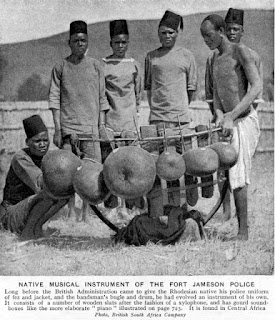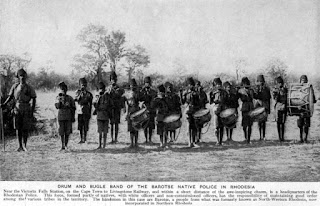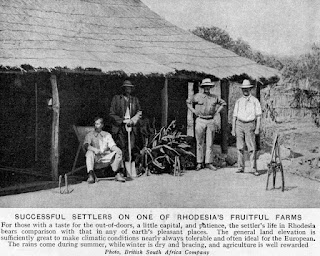I thought I might as well post a few more pictures from that interesting magazine "People of all Nations", published in 1922. I trawled through another volume that has many photos from Nigeria, Ghana, the Belgian Congo, Kenya, Ruanda and other countries. These books are always full of pictures showing you "native types", with captions like "statueseque water carrier", "black beauty" or "shy maiden".
Here also we read about the British Empire at a time when it was proud and sure of itself. Sir Sidney Low, lecturer on Imperial History at King's College, London University, tells us:
"The mood of mind which is called 'Imperialism' is not deeply rooted in the English character. Of all the great Western peoples, the British are the most imperial and the least imperialist. The idea of conquest, of ruling subjugated races and nationalities, has never appealed to the nation as a whole, though it may sometimes have fascinated classes and individuals and for brief periods has swept the country with a wave of emotion".
You see, we don't really want to rule you, it's just that we have to, for your own good. Of course, there was much good that came out of the empire, but such language does seem a tad disingenuous given the extent of the British Empire at this time
I don't normally do Southern Rhodesia, or other countries, but on this occasion I decided to make an exception, particularly since scanning an old large volume like this is quite tricky and (sigh) this time I've damaged the thing. Skipping past all the half clothed or shy maidens, I look for the buildings, streets, organisations and occasions. There are a some more Northern Rhodesian ones here as well.

Here we see villagers in remotest Africa; Akano (Nigeria), that is, "listening to the High commissioner's proclamation. It is a cardinal principle of British government in Africa to support native authority and to rule through native rulers in accordance with their own ideas and customs. Under the Pax Brittanica respect for authority is inculcated, the villagers are contented with their lot in settled and secure conditions and the townsmen are becoming public-spirited citizens of the British Empire". (Photo by Major Claud Percival.) The excellent TV series "Empire", with Jeremy Paxman, made a good point about this, quoting the line that the British Empire was ruled by bluff. In some cases the native ruler was appointed by the British, and had no previous authority, however.
Here are canoes on Lake Tanganyika (top) and Lake
Bangwelu (bottom). "Tall reeds stud wide expanses of Lake Bangweolo, greatly impeding the progress of canoes. Passengers squat in the bottom of the dug-out and trust to the balancing agility of the crew, who flourish their paddles as rope-walkers do their pole, and use them at once to propel and trim the boat."
This is the drum and bugle band of the Barotse Police in Northern Rhodesia, whose headquarters are near the Victoria Falls (railway) station. "This force formed partly of natives, with white officers and non-commissioned officers, has the responsibility of maintaining good order...." The bandsmen are Barotse, coming from what was formerly known as North-Western Rhodesia.

Here is a picture of the Fort Jameson police, in their uniforms of "fez and jacket", with their musical instrument, a marimba, as I know it. We had one of these xylophones for years in our living room. The dried gourds provide the resonating chamber for wooden slats fixed above them. The gourds had small holes in them, and these were covered with spider nest material. I don't know what you call that stuff - but our house wall spiders make a little white compartment to hatch their spiderlings, and that can be glued to the gourd to cover the hole. The slats are hit with sticks dampened with some material, in modern times probably car tyre or other rubber. The size of the gourd determines the note. Lovely things to hear, particularly when you get a few of them going together in poly-rhythm.

"The North Rhodesian natives in the neighbourhood of the capital, Livingstone, compete eagerly for the honour of being employed as canoe-boys to Government House. They make an exceedingly workmanlike appearance in the white jumpers, white shorts and sailor collars that form the official uniform".
And so to Southern Rhodesia... "For those with a taste for the out-of-doors, a little capital, a little patience, the settler's life in Rhodesia bears comparison with that in any of the world's pleasant places.... Agriculture is well rewarded".
This photo from the BSA shows "successful settlers".
And here is the photo I mentioned in an earlier posting of the Grand Hotel in Bulawayo with motorists "about to make the eighteen-mile excursion to the National Park in the Matopos. This is one of the popular trips from the town, which is Southern Rhodesia's commercial capital and has some six thousand white inhabitants."
 Then another street scene, this time Freetown, Sierra Leone. "Trade is the one goal in life of the Sierra Leonean; he is taught its secrets in the cradle".
Then another street scene, this time Freetown, Sierra Leone. "Trade is the one goal in life of the Sierra Leonean; he is taught its secrets in the cradle".
This street scene is in Zanzibar. Note the sign for the apothecary / chemist W. Richter and Co.
Liberia's president (under the umbrella) passes by with full military honours in Monrovia, outside the 'executive mansion' or 'white house', near the Mesurado Lagoon.
These troops are Liberian Frontier Force, apparently maintaining order in the wild interior.
'Sections are stationed at various points as need may require. The officers of the regiment have been drawn from among the coloured portions of the United States army.'
















